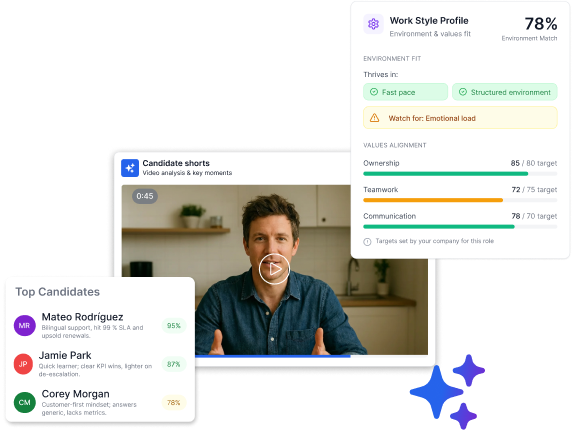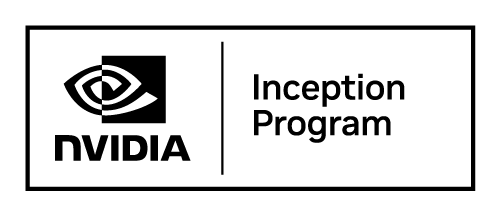You wake up to a full applicant queue. Your first thought isn't "great, let's find our next hire" — it's "when will I get through these?" Resume scans add up, scheduling becomes calendar Tetris, and most phone screens reveal the no in minutes. You're not here to automate hiring — you want your time back.
This guide covers what works for small teams: what each screening tool actually does (video, chat, resume scoring, talent assessments), real SMB pricing, integrations that don't need IT, and realistic setup times.
Plus a framework for choosing the right modality, running a pilot this week, and staying on the right side of compliance without turning it into a project.
What AI screening tools do (and don't do)
AI recruitment tools handle the repetitive early steps — parsing resumes, running knockout questions, conducting pre-screen interviews, generating transcripts and summaries — so you can focus on the candidates who are actually worth a conversation.
The line that matters: AI surfaces information. You make decisions.
When evaluating tools, look for assistive screening, not automated decisions. Assistive screening gives you match scores, transcripts, summaries, and flags. You keep control over criteria, who advances, and who you hire. That's better for quality and better for compliance.
What AI handles: Parsing and matching resumes to requirements. Running knockout questions (availability, certifications, location). Conducting async video or chat pre-screens with transcripts. Sending scheduling links and reminders.
What you keep: Setting criteria and rubrics. Choosing which signals matter. Reviewing and overriding AI outputs. Deciding who advances and who you hire.
Choose by AI candidate screening modality first
Most tools fit four categories. Don't shop features — pick the modality that removes your actual bottleneck.
- One-way video interviews. Candidates record structured answers on their schedule; you review with transcripts, summaries, and scores. Best when communication, judgment, or customer interaction matters and phone screens are eating your week. This is where Truffle fits.
- Chat/SMS screening. Automated conversations that qualify candidates on basics — availability, location, certifications — and hand off scheduling. Recruiting chatbots are best for hourly and shift roles where speed-to-contact matters more than depth.
- Resume automation. Parses and scores resumes against your requirements. Fast for credentialed roles with clear must-haves. Brittle with messy requirements, nontraditional paths, or roles where a resume doesn't tell you much.
- Assessments. Work samples, coding tests, situational judgment, typing speed. Proves role-specific skills directly. Keep them short (under 20 minutes) to protect completion rates — long assessments kill your funnel.
The rule: If your bottleneck is phone screens, don't buy resume scoring. If your bottleneck is sourcing, you need a different category entirely. Match the tool to the problem.
2026 shortlist: 6 AI screening tools compared
Full transparency: Truffle is our product. We built it to solve "too many applicants, not enough time." The comparisons below are meant to be useful and fair — but we're opinionated about async, structured screening for small teams. Pick the tool that fits your bottleneck.
Truffle — AI one-way video interviews
Best for: Lean TA teams and mid-market companies replacing phone screens for high-volume roles (support, sales, ops, hourly).
What it does: Paste a job description, generate a structured one-way interview, share one link. Get transcripts, AI summaries, match scores with reasoning, rubric-based scoring, and 30-second Candidate Shorts highlight reels. Candidates complete on any device — no app, no account.
Pricing: $99/month annual, $129/month month-to-month. Free trial, no credit card.
ATS: Greenhouse and Lever natively; Workday and iCIMS via Zapier or API. Syncs candidate identity, interview link, stage updates, notes, tags, and scores.
Setup: 10–15 minutes for a live job.
Tradeoffs: Not a full chatbot + scheduling + sourcing suite. Focused on structured first-round screening.
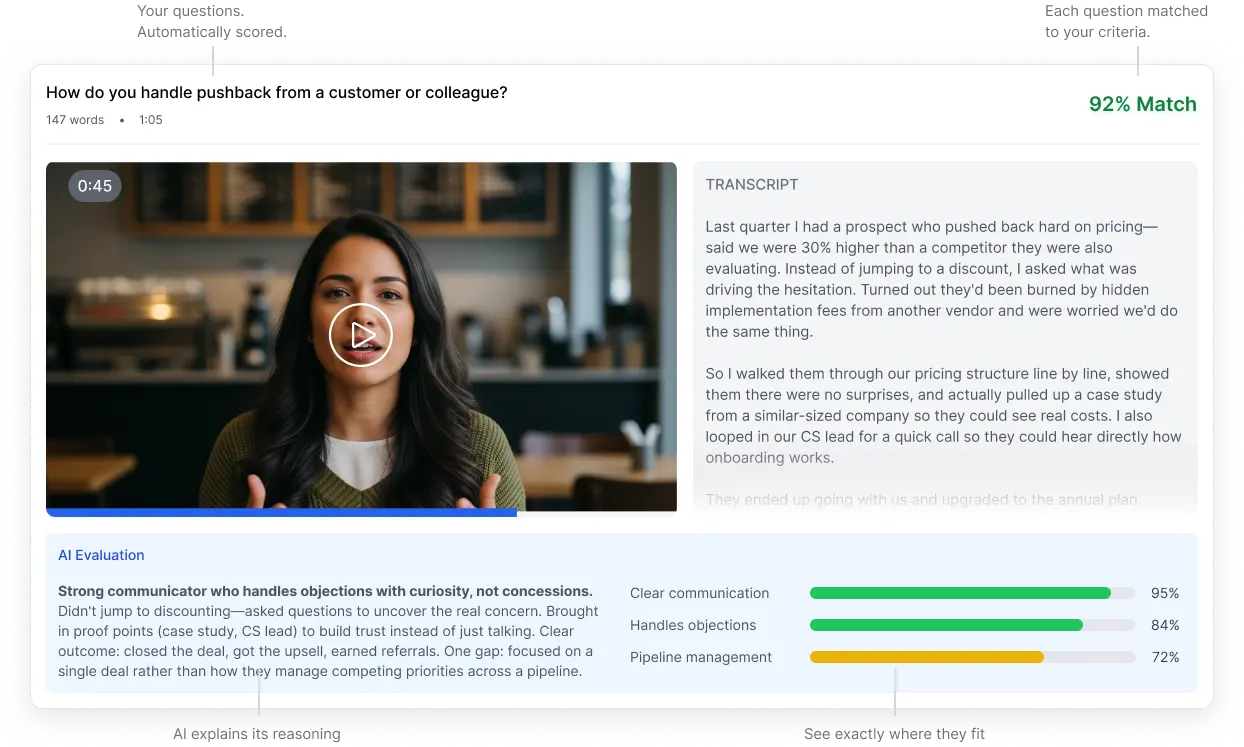
Paradox (Olivia) — Chat/SMS automation
Best for: Multi-location, high-volume hiring where speed-to-contact and scheduling are the main bottlenecks.
What it does: Chat/SMS conversations that screen candidates on basics, answer FAQs, and schedule interviews automatically. Always-on engagement for hourly funnels.
Pricing: Enterprise contracts — expect a sales process and annual commitment.
ATS: Deep integrations with Workday, iCIMS, UKG, SAP SuccessFactors, Oracle. Greenhouse and Lever via connectors.
Setup: 4–8 weeks. Workflow design and approvals add time.
Tradeoffs: Enterprise pricing and implementation timeline. Paradox is overkill if you're hiring for a handful of roles a month and just need better first-round screening.
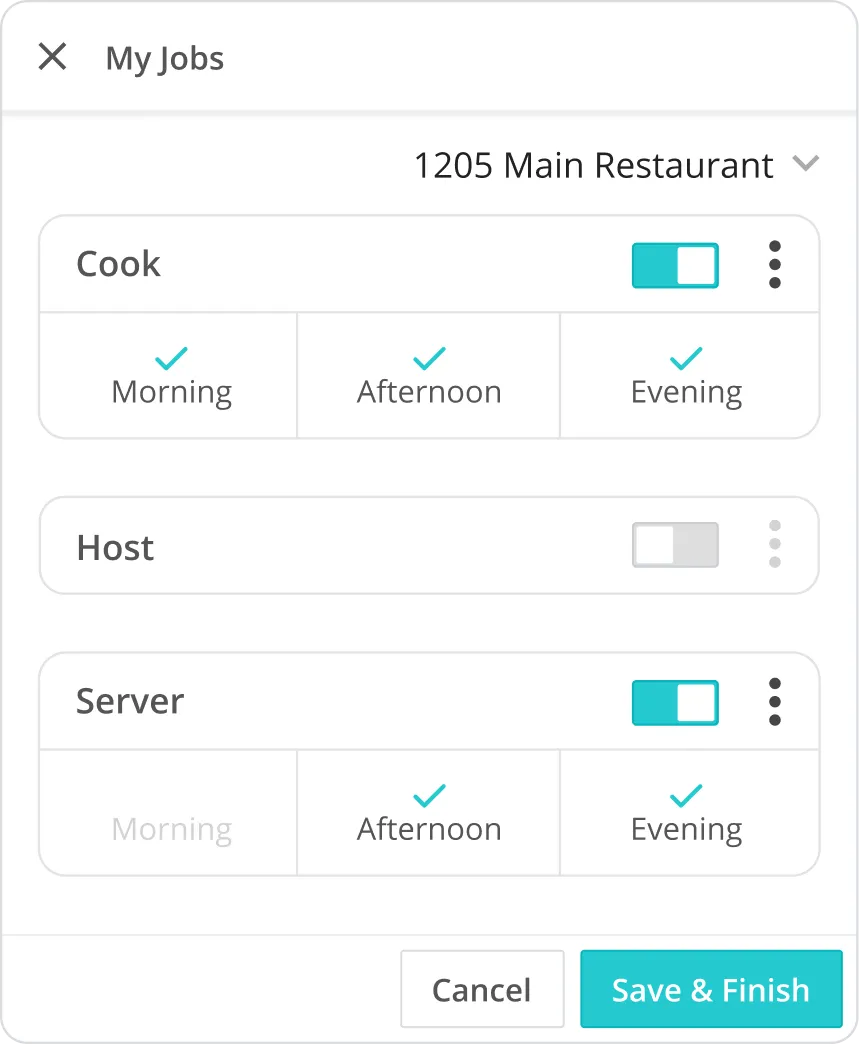
Eightfold AI — Talent intelligence and matching
Best for: Enterprises optimizing workforce planning, internal mobility, and matching across large applicant and employee populations.
What it does: AI-driven talent matching across applicants, employees, and internal mobility, integrated with HRIS/ATS data at scale.
Pricing: Enterprise. Expect longer sales cycles and significant implementation investment.
ATS: Workday, SAP SuccessFactors, Oracle, iCIMS. Deep HRIS/ATS sync — not SMB plug-and-play.
Setup: 8–16+ weeks.
Tradeoffs: Built for enterprise workforce strategy, not small-team first-round candidate screening. If your problem is "I have too many applicants and not enough hours," this isn't the right fit.
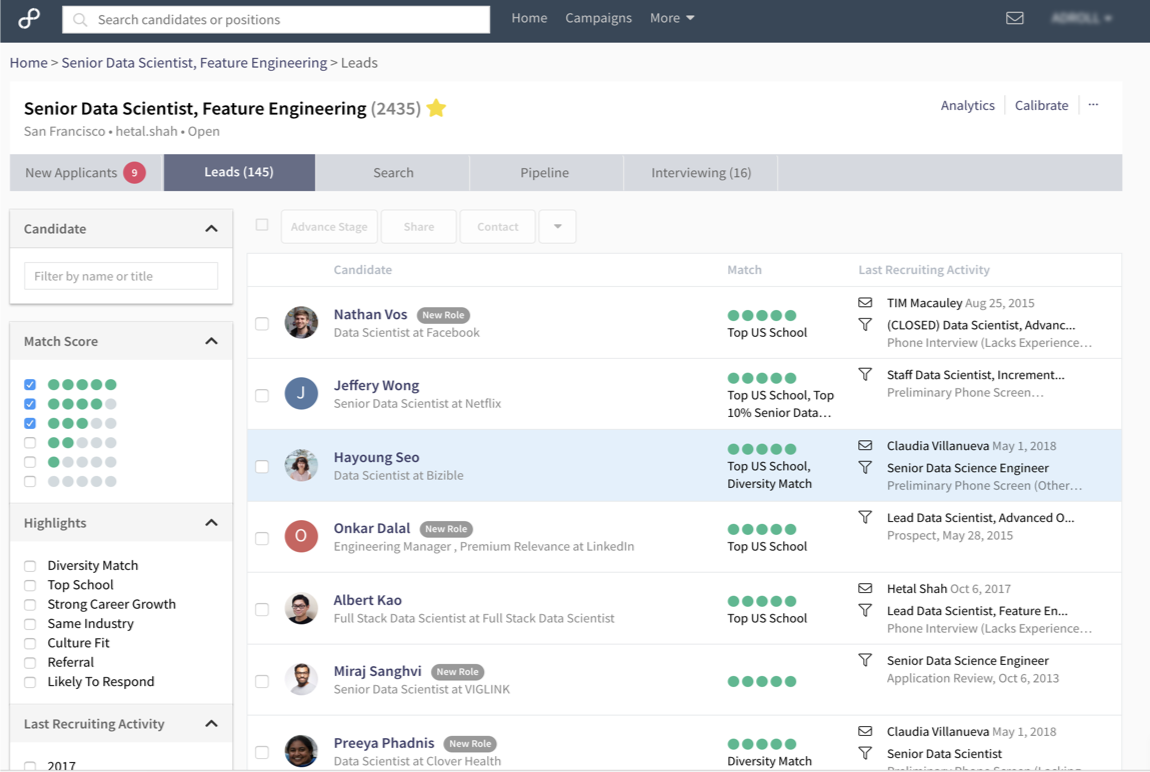
HireVue — Assessments and structured video
Best for: Mid-market and enterprise teams running standardized assessments with formal governance and documentation requirements.
What it does: Structured interviewing and assessments (on-demand video, game-based assessments, coding tests) with strong audit trails and compliance documentation.
Pricing: Mid-market and enterprise packages. Quote-based.
ATS: Workday, iCIMS, Greenhouse, Taleo. Sync scope varies by package — define it during procurement.
Setup: 2–6 weeks.
Tradeoffs: HireVue has stronger documentation and auditability than most SMB tools. Heavier implementation and pricing than self-serve options.
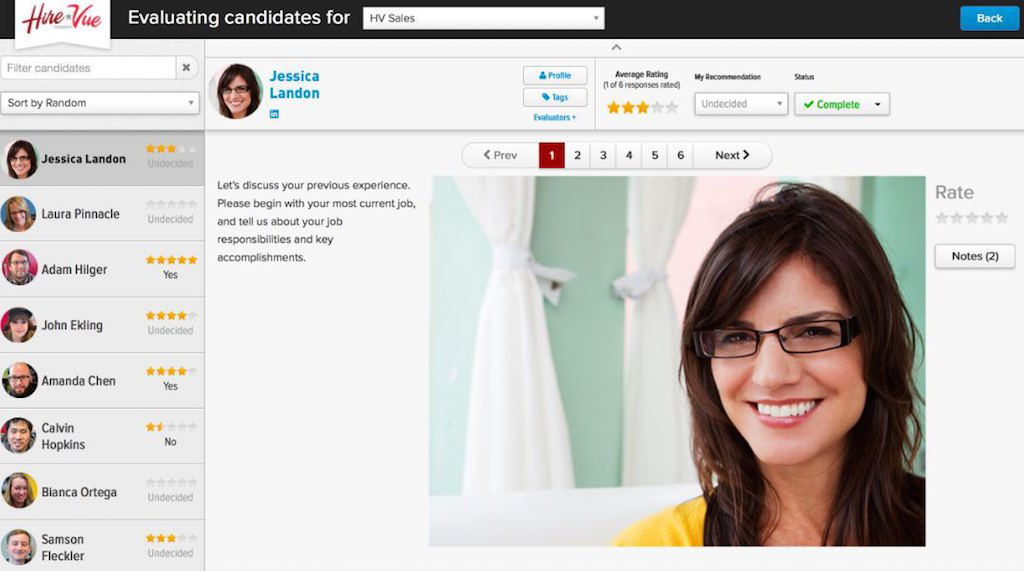
Humanly.io — Conversational screening and scheduling
Best for: Hourly and operations hiring needing fast text-first engagement and automated scheduling.
What it does: Chat/SMS screening that qualifies candidates on knockouts, answers questions, and coordinates scheduling — with structured responses for recruiter review.
Pricing: SMB to mid-market range. More accessible than enterprise chat platforms.
ATS: Greenhouse and others via APIs and connectors. Confirm what syncs: candidate info, knockout results, disposition, notes, and stage changes.
Setup: 1–3 weeks.
Tradeoffs: Conversation design needs care — poorly designed flows increase drop-off. Integration depth varies by ATS.
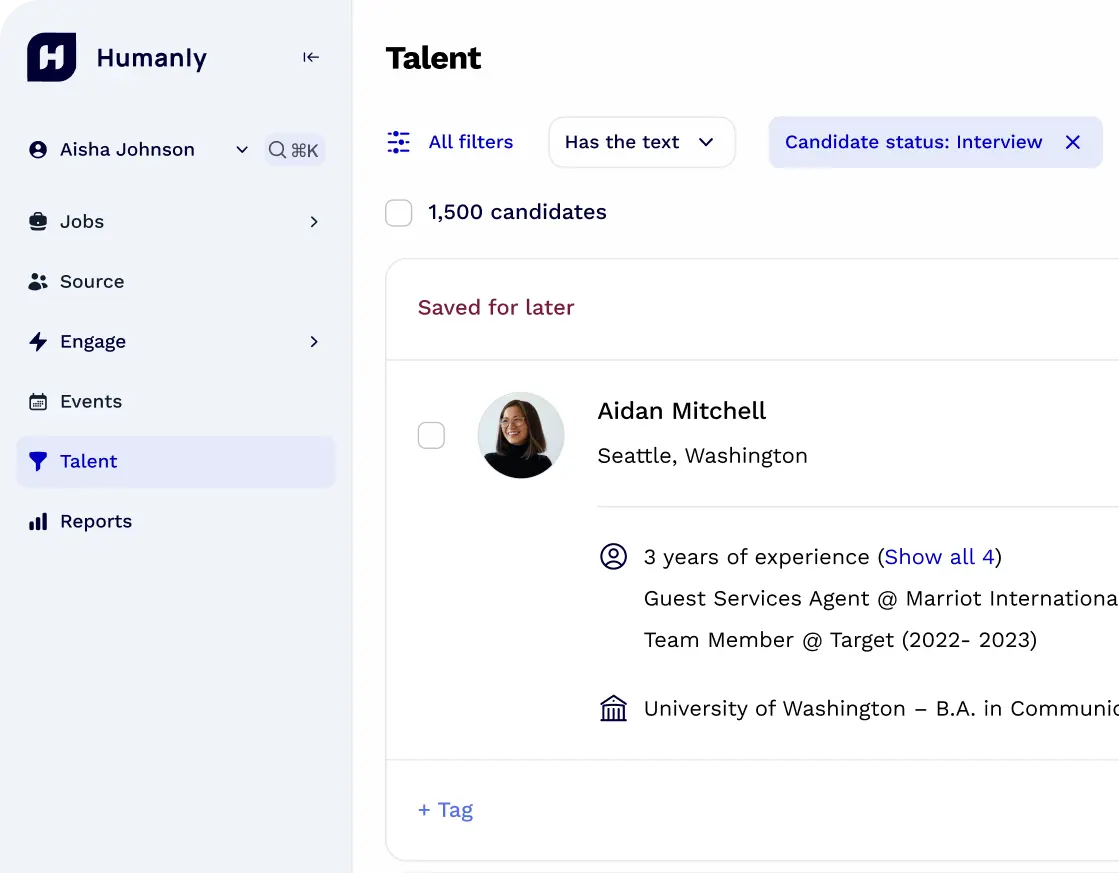
Fetcher — Sourcing automation
Best for: When sourcing — not screening — is the bottleneck. Hard-to-fill roles where you don't have enough inbound applicants.
What it does: Outbound sourcing automation. Builds prospect lists, runs email outreach, and pushes interested candidates to your ATS.
Pricing: SMB to mid-market.
ATS: Greenhouse and Lever. Pushes prospects as candidates with source tags and outreach context.
Setup: 1–2 weeks.
Tradeoffs: Solves "not enough applicants," not "too many applicants." You still need screening once replies arrive.
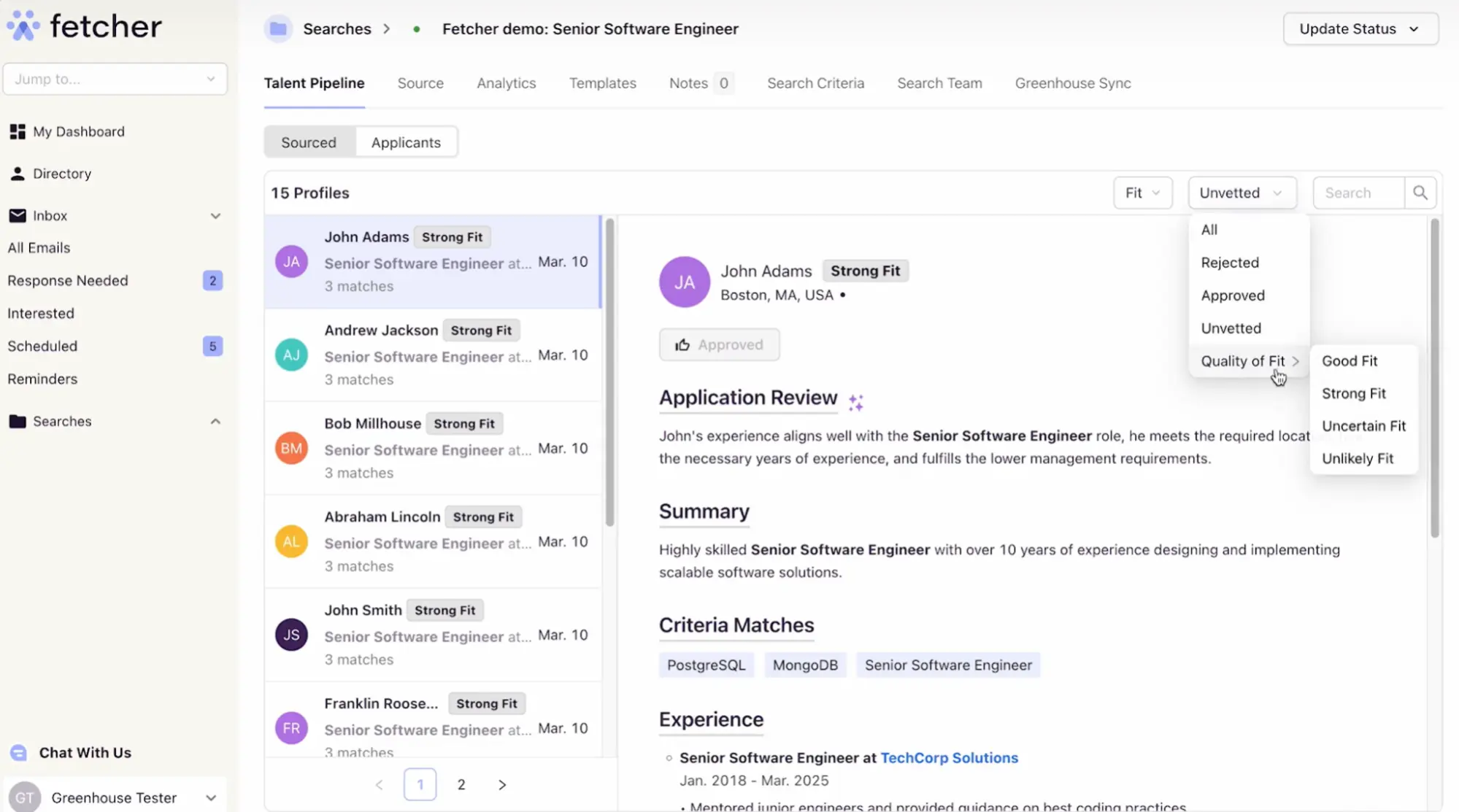
How to choose and pilot AI screening tools this week
You don't need a six-month evaluation. Pick a tool, test it on one role, and measure whether it saves time.
Step 1: Name the bottleneck
Where does time actually die? Resume review, phone screens, scheduling, or reviewer alignment? Be specific: The answer determines which modality to buy.
Step 2: Match modality to bottleneck
Phone screens eating your week → one-way video. Candidates ghosting before you respond → chat/SMS. Resume pile with clear must-haves → resume automation. Need to prove skills directly → assessments.
Step 3: Confirm pricing and trial access
Look for transparent monthly plans and a free trial with enough volume to actually test (at least 25–50 candidates). If the vendor requires a sales call to give you a price, they're built for a different buyer.
Step 4: Validate ATS integration
"Integrates with Greenhouse" can mean real-time sync or a pasted link. Get specific: does it sync candidate identity (no duplicates), trigger invites on stage change, write back results and scores, and update disposition status? If the vendor can't demo the full loop for your ATS, expect manual work.
Step 5: Run a 7–14 day pilot
Pick one high-volume role. Track completion rate (are candidates finishing?), review time per candidate, and whether the shortlist holds up when you move people to live interviews. If there's no clear win in two weeks, move on.
Step 6: Check compliance basics
You're accountable for fair process regardless of what tools you use. Look for: audit logs (who changed questions, rubrics, thresholds), explainable scoring tied to job-relevant criteria, human override on every decision, data retention and deletion controls, and a cadence for reviewing pass-through rates to catch patterns you'd want to investigate.
This isn't a one-time checkbox — it's a lightweight ongoing practice. Quarterly reviews are a reasonable starting point for most small teams.
Pricing: what to expect in 2026
AI recruiting software pricing is the first filter for small teams. Here's what the landscape looks like:
Self-serve / SMB tools (Truffle, Humanly.io, Fetcher, smaller resume and assessment tools) typically offer monthly plans accessible without a sales call. Truffle is $99/month annual. Others range from roughly $100–$500/month depending on seats, volume, and features.
Enterprise platforms (Paradox, Eightfold, HireVue at scale) start in the tens of thousands annually and require procurement cycles, implementation projects, and often dedicated support.
What drives cost: Number of recruiter seats, candidate volume or job count, integration depth (native vs. Zapier vs. API), security features (SSO, SAML, SCIM), and whether AI features are included or gated to higher tiers.
What to watch for: Per-interview or per-candidate pricing that spikes with volume. Feature gating that puts AI summaries, scoring, or ATS write-back behind expensive tiers. "Free trial" that limits features so heavily you can't actually evaluate the workflow.
The real question: Does the tool save you enough hours per role to pay for itself within the first month or two? For most small teams hiring regularly, a $99–$300/month tool that cuts review time significantly is an easy yes. The math gets harder with enterprise platforms that require five-figure commitments before you've proven the workflow.

